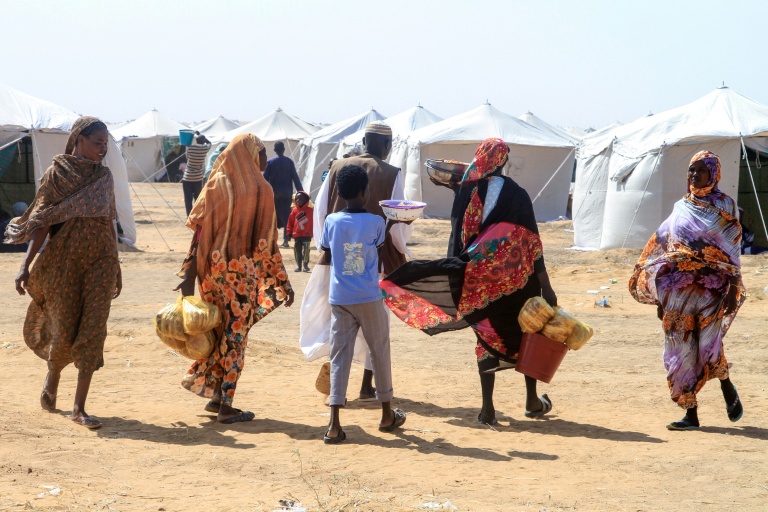World
Survivors Describe Devastating 770 km Escape from El-Fasher

Survivors of the violent takeover in El-Fasher have recounted their harrowing escape, which involved a treacherous 770-kilometre trek through desert landscapes. This mass exodus was triggered following the fall of the city to Sudan’s paramilitary group, the Rapid Support Forces (RSF), on October 26, 2023. Nearly 100,000 people fled El-Fasher, seeking refuge from widespread violence and humiliation at the hands of armed groups.
Now sheltering at the Al-Dabbah refugee camp in Northern State, approximately 480 miles northeast of El-Fasher, many survivors have shared their traumatic experiences. The journey was marked by extreme hunger, thirst, and the sight of dead bodies lining the roads. Zahra Youssef, one of the survivors, described the ordeal, stating, “We arrived here completely exhausted. We thought we were going to die. There was no water, no food. The roads were impassable. It was desert.”
Desperate Accounts of Violence and Humiliation
According to local authorities, around 50,000 people have reached Al-Dabbah since the RSF besieged El-Fasher in May 2024. The conflict, which has lasted over two and a half years, has led to the deaths of tens of thousands and displaced nearly 12 million individuals, according to the United Nations. The ongoing humanitarian crisis is now recognized as one of the worst globally, with efforts for a humanitarian truce remaining stalled.
Hussein Mohamed, who fled with his family, described an “inhuman” journey. “Just a kilometre outside El-Fasher, a man pointed a gun at us. Soon after, we found three men running in our direction. That’s when the body searches and insults began.” He recounted the horrific treatment of women during these encounters, where soldiers would disregard pleas for dignity. “They searched the women horribly. One woman said, ‘I have my period,’ but they ignored her,” he said.
The checkpoints became sites of terror. “They made us get out of our vehicles. They took nine young men, accusing them of being soldiers. They began torturing them. They kicked them in the head,” Mohamed added.
Impact on Families and Communities
The accounts from survivors highlight not only the physical dangers but also the psychological trauma inflicted during the flight. Suleiman Mohamed described the humiliation faced by women, stating, “They touched the women, even taking off their undergarments. They searched us like we weren’t human beings.” He noted that his family lost nearly all their money during the ordeal.
The experiences of children were equally harrowing. Twelve-year-old Mohamed Adam fled with his mother and siblings, recalling a particularly chilling encounter. “They wanted to rape my sisters. My mother told them, ‘Rape me instead, but not the girls.’ Then, they threw stones at us as we ran away.”
Survivors like Mazaher Ibrahim expressed that even walking in groups did not guarantee safety. “When we girls walk together, we put henna on our hands even if we’re not married. The RSF prefer unmarried girls. They boast about killing and about taking girls’ virginity,” she remarked.
As those who survived the arduous trek settle into overcrowded camps, the lack of food and medical care amplifies their suffering. Many mourn lost family members and are haunted by the traumatic memories of their escape. The international community continues to grapple with how to address the deepening humanitarian crisis in Sudan while the conflict persists.
-

 Science3 months ago
Science3 months agoToyoake City Proposes Daily Two-Hour Smartphone Use Limit
-

 Top Stories3 months ago
Top Stories3 months agoPedestrian Fatally Injured in Esquimalt Collision on August 14
-

 Health3 months ago
Health3 months agoB.C. Review Reveals Urgent Need for Rare-Disease Drug Reforms
-

 Technology3 months ago
Technology3 months agoDark Adventure Game “Bye Sweet Carole” Set for October Release
-

 World3 months ago
World3 months agoJimmy Lai’s Defense Challenges Charges Under National Security Law
-

 Lifestyle3 months ago
Lifestyle3 months agoVictoria’s Pop-Up Shop Shines Light on B.C.’s Wolf Cull
-

 Technology3 months ago
Technology3 months agoKonami Revives Iconic Metal Gear Solid Delta Ahead of Release
-

 Technology3 months ago
Technology3 months agoApple Expands Self-Service Repair Program to Canada
-

 Technology3 months ago
Technology3 months agoSnapmaker U1 Color 3D Printer Redefines Speed and Sustainability
-

 Technology3 months ago
Technology3 months agoAION Folding Knife: Redefining EDC Design with Premium Materials
-

 Business3 months ago
Business3 months agoGordon Murray Automotive Unveils S1 LM and Le Mans GTR at Monterey
-

 Technology3 months ago
Technology3 months agoSolve Today’s Wordle Challenge: Hints and Answer for August 19









